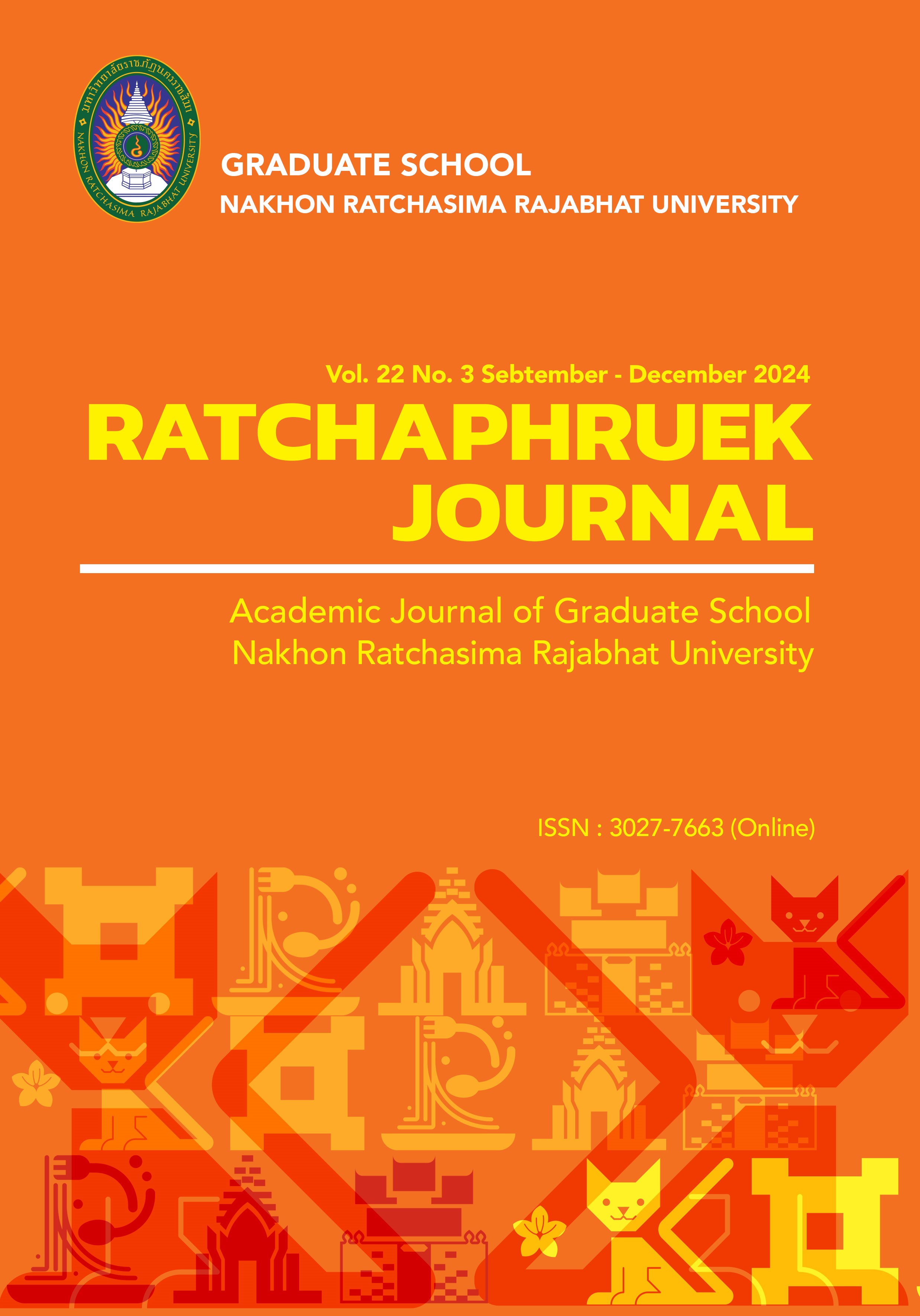The Effects of Mathematics Activities Based on Community Based Learning to Enhance Mathematical Literacy and Awareness in SDGs for Upper Primary School Students
Main Article Content
Abstract
The objectives of the research were to: 1) Design mathematics activities based on community-based learning; 2) Study the results of using mathematics activities based on community-based learning towards mathematics literacy; and 3) Study the results of using mathematics activities based on community-based learning for upper primary school students towards awareness in SDGS. The research instruments were) five lesson plans, a mathematics literacy test, and the SDGS awareness test. The target group in this study was 39 students in the upper primary level of Banhuatanon School in Mueang District, Chumphon Province, in the second semester of the academic year 2023. Activities are organized based on the mathematics activity plan in the Moderate Class, More Knowledge. Methods used to analyze the data were percentage, mean and standard deviation.
The finding showed that 1) the result of using mathematics activities based on community-based learning for upper primary school students towards mathematics literacy, the suitability evaluation results in the most appropriate criteria. 2) The result of the assessment of mathematics literacy for upper primary school students in the target group was an average of 14.73, accounting for 61.38 percent; and 3) The result of the assessment of awareness in SDGS was an average of 3.30, which means that the students had a moderate level of awareness.
Article Details

This work is licensed under a Creative Commons Attribution-NonCommercial-NoDerivatives 4.0 International License.
References
กาญจนา เงารังษี. (2559). การศึกษากับการพัฒนาที่ยั่งยืน. วารสารสมาคมนักวิจัย, 21(2), น. 13-18.
ณรงค์เดช มหาศิริกุล และพีร์นิธิ อักษร. (2563). การตระหนักรู้เกี่ยวกับป้ายจราจรชั่วคราวกับการใช้งานเซลลูลาร์ดาตาบนสมาร์ทโฟน: แนวคิดสำหรับการจัดการความปลอดภัยในรูปแบบดิจิทัล. Local Administration Journal, 14(1), น. 37-52.
ประไพ ศิวะลีราวิลาศ. (2549). การพัฒนารูปแบบการศึกษาโดยใช้ชุมชนเป็นฐานเพื่อพัฒนาต้นทุนทางสังคม (วิทยานิพนธ์ดุษฎีบัณฑิต, จุฬาลงกรณ์มหาวิทยาลัย).
วิไลภรณ์ ฤทธิคุปต์. (2561). การจัดการเรียนรู้โดยใช้ชุมชนเป็นฐาน: กลยุทธ์การจัดการเรียนรู้ที่มีประสิทธิภาพของครูในศตวรรษที่ 21. วารสารบัณฑิตศึกษา มหาวิทยาลัยราชภัฏเชียงราย, 11(3), น. 179-191.
สถาบันส่งเสริมการสอนวิทยาศาสตร์และเทคโนโลยี. (2563). PISA 2021 กับการประเมินความฉลาดรู้ด้านคณิตศาสตร์. สืบค้นเมื่อ 26 มิถุนายน 2565, จาก https://pisathailand.ipst.ac.th/ infographics-issue-2020-53/
สถาบันส่งเสริมการสอนวิทยาศาสตร์และเทคโนโลยี. (2565). PISA THAILAND. สืบค้นเมื่อ 26 มิถุนายน 2565, จากhttps://pisa thailand.ipst. ac.th/about-pisa/
สมนึก ภัททิยธนี. (2560). การวัดผลการศึกษา (พิมพ์ครั้งที่ 11). กาฬสินธุ์: ประสานการพิมพ์.
อรนุช ลิมตศิริ. (2542). หลักสูตรและการเรียนการสอนในระดับประถมศึกษา. กรุงเทพฯ: มหาวิทยาลัยรามคำแหง.
Bedri Z., de Fréin, R., & Dowling, G. (2017). Community-based learning: A primer (Research report). Dublin: Technological University Dublin.
ErlİNa, N., Suardana, I. N., WİCaksono, I., PandİAngan, P., & BudİAstra, A. A. K. (2022). Education for sustainable development-based lesson plan validity test for mastery of pre-service science teacher learning outcomes. Journal for the Education of Gifted Young Scientists, 10(1), pp. 85-97.
Gafoor, K. A. (2012). Considerations in the measurement of awareness. National Seminar on Emerging trengs in education. Kerala, India: University of Calicut.
Garoutte, L. (2017). The Sociological imagination and community-based learning: using an asset-based approach. Teaching Sociology, 46(2), pp. 148-159.
Günther, J., Overbeck, A. K., Muster, S., Tempel, B. J., Schaal, S., Schaal, S., Otto, S. (2022). Outcome indicator development: Defining education for sustainable development outcomes for the individual level and connecting them to the SDGs. Global Environmental Change, 74(3), p. 102526.
Ibrahim, M. (2010). The use of community based learning in educating college students in Midwestern USA. Procedia-Social and Behavioral Sciences, 2(2), pp. 392-396.
Ongon, S., Wongchantra, P., & Bunnaen, W. (2021). The effect of integrated instructional activities of environmental education by using community-based learning and active learning. Journal of Curriculum and Teaching, 10(2), pp. 42-57.
Poole, A. H. (2022). Putting community-based learning and librarianship into practice. In Malte Smits (Ed.). Information for a Better World: Shaping the Global Future (pp. 69-78). Springer: Switzerland.
Rhee, E. (2018). Teaching community-based learning course in retailing management. Journal of Marketing Education, 40(1), pp. 47-55.
United Nations Educational, Scientific and Cultural Organization (UNESCO). (2017). Education for Sustainable Development Goals Learning Objectives. Retrieved June 16, 2022, from https://unesdoc.unesco.org/ark:/48223/pf0000247444
Vukić, T. (2020). Sustainable development from high school teachers’ perspective. Facta Universitatis, Series: Philosophy, Sociology, Psychology and History, 8(3), pp. 131-148.


